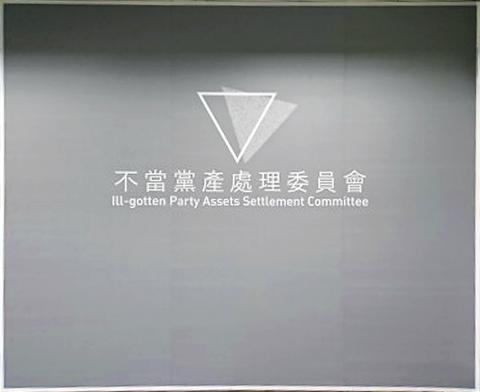The Ill-gotten Party Assets Settlement Committee is to hold a hearing on Tuesday next week to determine whether three properties under the Chinese Nationalist Party’s (KMT) name should be considered ill-gotten assets.
The buildings on one property once housed the KMT’s former cultural affairs department. The Housheng building, the original headquarters of the party’s Department of Productive Enterprise, and the Chongsheng building, which used to house the party’s Taipei chapter headquarters, are on the other two properties.
The committee said that it wished to clarify whether the properties were obtained by the KMT in contravention of the bounds of a political party, or other democratic or legal principles.

Photo: Taipei Times file photo
If the properties — which have already been sold — were ill-gotten, it wanted to know whether the state should demand that the KMT pay it for them and how such compensation should be calculated, the committee added.
The building housing the cultural affairs department originally belonged to the Taipei City Government and was in 1950 converted into dormitories and leased to the now-defunct Taiwan Provincial Government’s Department of Public Construction, it said.
The KMT had occupied state property illegally and did not return it to the Taipei City Government, even after the provincial government had relocated to Taichung, the committee said.
The party had also demolished a building on the property that was built in the Japanese era to build a high-rise building, which housed the cultural affairs department and the Ministry of National Defense’s Psychological Warfare Department, the committee said.
While the KMT had signed a lease with the city government, it overstayed the lease period and occupied the building illegally up until the 1980s, after which the party, which could not purchase the land itself, bought the land under the names of former premier Hsu Li-te (徐立德) and former Control Yuan member Wu Shui-yun (吳水雲), the committee said.
The KMT allegedly made a profit of NT$650 million (US$21.59 million at the current exchange rate) when it sold the building to Universal Real Estate Development Co in 2000, it said.
The KMT also obtained ownership of the Housheng building — despite it originally belonging to Taiwan Power Co — and sold the property to a third party in about 2000, the committee said.

The Ministry of Economic Affairs has fined Taobao NT$1.2 million (US$36,912) for advertisements that exceed its approved business scope, requiring the Chinese e-commerce platform to make corrections in the first half of this year or its license may be revoked. Lawmakers have called for stricter enforcement of Chinese e-commerce platforms and measures to prevent China from laundering its goods through Taiwan in response to US President Donald Trump’s heavy tariffs on China. The Legislative Yuan’s Finance Committee met today to discuss policies to prevent China from dumping goods in Taiwan, inviting government agencies to report. Democratic Progressive Party Legislator Kuo Kuo-wen (郭國文) said

The Ministry of Economic Affairs has fined Taobao NT$1.2 million (US$36,900) for advertisements that exceeded its approved business scope and ordered the Chinese e-commerce platform to make corrections in the first half of this year or its license would be revoked. Lawmakers have called for stricter supervision of Chinese e-commerce platforms and more stringent measures to prevent China from laundering its goods through Taiwan as US President Donald Trump’s administration cracks down on origin laundering. The legislature’s Finance Committee yesterday met to discuss policies to prevent China from dumping goods in Taiwan, inviting government agencies to report on the matter. Democratic Progressive Party

Taiwan and its Pacific ally Tuvalu on Tuesday signed two accords aimed at facilitating bilateral cooperation on labor affairs, according to Taiwan’s Ministry of Foreign Affairs (MOFA). The governments inked two agreements in Taipei, witnessed by Foreign Minister Lin Chia-lung (林佳龍) and visiting Deputy Tuvaluan Prime Minister Panapasi Nelesone, MOFA said in a news release. According to MOFA, the agreements will facilitate cooperation on labor issues and allow the two sides to mutually recognize seafarers’ certificates and related training. Taiwan would also continue to collaborate with Tuvalu across various fields to promote economic prosperity as well as the well-being of their

Sung Chien-liang (宋建樑), who led efforts to recall Democratic Progressive Party (DPP) Legislator Lee Kun-cheng (李坤城), was released on bail of NT$80,000 today amid outcry over his decision to wear a Nazi armband to questioning the night before. Sung arrived at the New Taipei District Prosecutors’ Office for questioning in a recall petition forgery case last night wearing a red armband bearing a swastika, carrying a copy of Adolf Hitler’s Mein Kampf and giving a Nazi salute. Sung left the building at 1:15am without the armband and covering the book with his coat. Lee said today that this is a serious